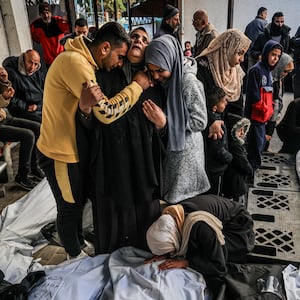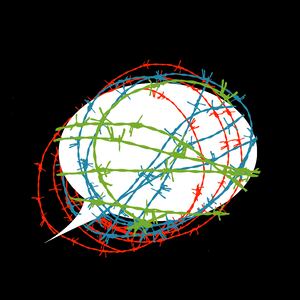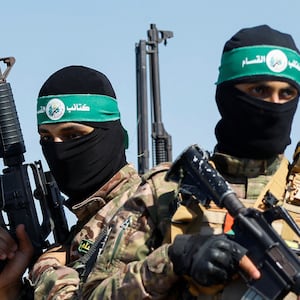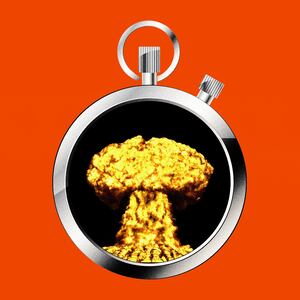The Oct. 7 attacks on southern Israel—and the subsequent Gaza war—are rarely understood in their primary political context, which is the power struggle among Palestinian factions.
The near-universal assumption is that Hamas viewed its surprise offensive as another phase in a long-term war against Israel. There’s some truth to it, but that misreads why Hamas decided now to deliberately provoke a massive Israeli response—which is the long-standing power struggle between the Islamists in Hamas and their smaller ally, Palestinian Islamic Jihad (PIJ), against the secular nationalists of Fatah who control the Palestinian Authority (PA) in the West Bank and, more importantly, the Palestine Liberation Organization (PLO) which represents Palestinians diplomatically.
Fatah, of course, knows this full well, but a surge of nationalist sentiment and shared outrage at the mass killing and suffering of the 2.2 million Palestinian civilians in Gaza muffled nationalist leaders like President Mahmoud Abbas (also the chairman of the PLO) in publicly acknowledging Hamas’ breathtaking cynicism.
But now that we’re into the fifth month of the carnage with no end in sight, Fatah leaders appear to be sensing enough of a mood shift among Palestinians to permit such criticisms without unsustainable political blowback. Their denunciations of Hamas have been harsh and, if this perspective eventually takes root among most Palestinians, potentially devastating.
WHO LEADS THE PALESTINIANS?
U.S., European, and Arab pressure for PA reform led Abbas on March 14 to replace then-prime minister Mohammad Shtayyeh with economist Mohammad Mustafa. Hamas snidely called Abbas “out of touch with reality,” and implied that, following Oct. 7, it should have a direct say in any change of government within the PA. It was one of the first overt assertions of a newfound degree of self-appointed national authority by the Islamist group—which is portraying itself, on the basis of the major conflict it has engineered with Israel, as the real leader of the Palestinians.
The intensity and bluntness of the official Fatah reply strongly signaled that Palestinian nationalists are in no mood to give any ground to the fundamentalists.
“Those who caused Gaza to return to living under Israeli occupation and caused a nakba [catastrophe] to befall the Palestinian people, especially in Gaza, have no right to make dictates related to national priorities,” Fatah said, batting aside Hamas’ assertion of authority. “The real side that is out of touch with reality and the Palestinian people is the Hamas leadership that has until this moment failed to realize the extent of the catastrophe endured by our oppressed people in Gaza and the rest of the Palestinian territories,” it continued, shifting quickly into a narrative framework that, for the first time in major Palestinian politics, acknowledged the full extent of Hamas’ responsibility for deliberately provoking Israel’s entirely predictable onslaught.
Fatah’s statement flung the accusation of unilateralism back at Hamas, saying the Islamists consulted with no other Palestinians before launching “an adventure on Oct. 7 that has led to a nakba that is more severe than the 1948 Nakba,”—one of the most punishing accusations in the Palestinian political lexicon.
The statement then asks if Hamas is consulting with any other Palestinians while it negotiates indirectly with Israel to ensure the safety of its leaders, many of whom “live a life of luxury” in ”seven star hotels”—implicitly in Qatar where most of the Hamas Politburo has resided since fleeing Syria in 2012. This exile and “luxury” has “blinded it [the Hamas leadership] to reason,” Fatah asserts, urging them to abandon their alleged policy of promoting “foreign agendas”—implicitly Qatari, Turkish, and Iranian—and “return to the national fold.”
Clearly stung, Hamas enlisted other perennial critics of Fatah—the PIJ, plus two small left-wing groups—in reiterating that the PA is acting “unilaterally” in a manner that “has harmed and continues to harm our people and national cause.” Instead, they insist, “the top national priority lies in confronting the barbaric systematic Zionist aggression and its genocide and war of starvation, not forming a new government.”
This bitter exchange will complicate the formation of a national unity government, which many Palestinians want. More importantly, an unspoken and even taboo truth has been uttered by Palestinians at the highest level—acknowledging Hamas’ evident culpability for actions that made Israel’s savage war of vengeance in Gaza entirely foreseeable, if not inevitable.
The accusation about Hamas negotiating with Israel only about the fate of its leaders invites readers to extrapolate that, in deciding to launch the Oct. 7 attack, Hamas similarly only cared about its political agenda—and not the lives or basic needs of Palestinians in Gaza.
If these accusations are repeated—as they certainly should be on a daily, if not hourly, basis—they could create the permission structure for ordinary Palestinians everywhere, and especially in Gaza, to begin honestly asking themselves why Hamas acted on Oct. 7 without regard to the impact on the people of Gaza or making any preparations whatsoever for them.

Abandoned and torched vehicles at the site of the October 7 attack on the Supernova desert music Festival by Palestinian militantsin the Negev desert in southern Israel.
Jack Guez/Getty ImagesHAMAS’ MAIN TARGET
Hamas was not acting on behalf of the Palestinian people or their national cause on Oct. 7. It was pursuing its founding prime directive.
Established in 1987 during the crucible of the first intifada (uprising) against Israeli occupation by ordinary Palestinians living under that brutal repression, Hamas’ goal was (and remains) the accumulation of political power and the eventual takeover of the Palestinian national cause from the secularists (led by Fatah) and turning it into an Islamist movement.
Hamas has made many important strides towards that goal, but the PA remains in Fatah’s hands.
Moreover, the prize jewel in the Palestinian national crown, also still firmly in Fatah’s control, is the diplomatic standing and presence of the PLO in 130 embassies and missions around the world. The PLO, alone, speaks for the Palestinians internationally, in countless multinational and multilateral agencies and organizations, at the Arab League, and—above all—as a non-member observer state at the U.N. General Assembly. Even Hamas, despite its bitter criticisms of its policies, does not dispute the diplomatic authority of the PLO.
Whoever controls the PLO speaks for the Palestinians on the Arab, Middle Eastern, and global stages—and Hamas has never had any role in it whatsoever.
Hamas claims it was trying to return the issue of Palestine to the Middle Eastern and international forefront. The group also asserts that it struck an invaluable blow to reassert Palestinian defiance and determination. Insofar as that’s true, it’s at an intolerably high price to both Palestinians and their prospects for self-determination.
In fact, the Oct. 7 attack was a calculated political gambit. Those who link Oct. 7 to the rapid progress being made between Saudi Arabia and the United States on a potential triangular deal with Israel (although meaningful Israeli cooperation remained unsecured) are not wrong. Hamas was indeed acting in large part to scupper that potential breakthrough.
But this is usually, and incorrectly, viewed in terms of Hamas’ rather complex alliance with Iran. No doubt Tehran rejoiced when Israel’s medieval rampage on Gaza froze further progress on the deal that would have formed the bedrock of a much stronger and more integrated U.S.-led alliance confronting Iran’s regional ambitions. But the Middle Eastern strategic landscape was not at the top of Hamas’ motivations. Rather than the regional big picture, Hamas was again concentrating on the domestic Palestinian partisan power struggle.
On the eve of Oct. 7, Hamas was in big trouble. It was bogged down in Gaza, which was starting to look more like a trap than a launching pad. It could sense a waning of Turkish support and Qatari unease about footing the bill in Gaza into the foreseeable future. Both were grumbling about Hamas needing to do more for itself.
Worse, Hamas was even losing the initiative on its core brand among Palestinians—armed struggle. Militancy was its only real political competitive advantage against Fatah, the PA, and the PLO, all of which had staked their futures on securing a negotiated peace agreement with Israel.
But in recent years, newer and unaffiliated armed youth gangs in the inner cities of the West Bank—such as the Lions’ Den in the old city of Nablus and the Jenin Brigades in the refugee camps outside of that city—began challenging Israeli occupation forces and armed settlers. Even on the matter of armed struggle, Hamas was losing the momentum to forces in the West Bank it could not control or even challenge.
The last straw was looming in the potential American-Israeli-Saudi understandings that were gaining considerable momentum last summer. There were two tracks, both involving Washington. The U.S. and Saudi Arabia were negotiating over a new defense agreement and Saudi Arabia's nuclear energy program, while the U.S. and Israel held parallel discussions about a “significant Palestinian component” that would facilitate Saudi normalization with Israel.
The gains designed to make the agreement politically acceptable to Saudi Arabia—and to at least somewhat mollify Abbas—would have been a great deal of Saudi money for Ramallah and some political concessions from Israel to strengthen the PA on the ground, and probably even the PLO at the diplomatic register. All of the financial and political goodies would have accrued exclusively to Fatah, which seemed poised to secure the first tangible steps forward, however minimal, for Palestinians in decades. This might have presented Fatah with a vindication of its strategy of diplomacy versus Hamas’ rhetoric about endless armed struggle.

Fatah supporters lift flags and banners during a rally marking the 59th anniversary of the movement in Ramallah.
Zain Jaafar/Getty ImagesA U.S.-Saudi finger was poised to press firmly down on the other side of the scale in a delicately balanced equilibrium of national division. It had to be stopped. And it was.
After Oct. 7 and Israel’s vicious response, Saudi Arabia froze further talks. In January, though, the Saudis reiterated they were still interested in a triangular deal, but the price tag for Israel had gone up. Israel, they insist, must recognize the Palestinian right to a state and commit to the eventual creation of one.
Hamas has the whole world once again talking about Palestinian statehood, albeit largely as a means of politically pushing back against the organization’s agenda and prospects. Yet Israel hasn’t been this opposed to Palestinian statehood since before 1993, with rejections not merely from Prime Minister Benjamin Netanyahu but his whole Cabinet and a large Knesset majority.
Fatah’s statement should inaugurate a serious and sustained Palestinian debate about the bloodthirsty Oct. 7 killing spree. Was it a net, or even major, gain for Palestinians? Or has it been a net, and indeed unimaginably disastrous, loss for them? That’s certainly the meaning of Fatah's phrase “worse than the nakba of 1948.”
Did Hamas have any right to subject 2.2 million Palestinians to the unmitigated brutality of Israel’s response which, while profoundly shocking, cannot truly surprise anyone familiar with Israeli-Palestinian history. Hamas intended and expected to provoke Israel into a large war and a long-term reoccupation of the urban centers of Gaza. Israeli leaders are obliging them perfectly.
A late February message to other Hamas leaders in Doha and Beirut from the organization’s overall leader and chief in Gaza, Yahya Sinwar, was accurately paraphrased by The Wall Street Journal as, “Don’t worry, we have the Israelis right where we want them.” This is because, as I wrote in The Atlantic on Nov. 1, ”Hamas hopes to lure Israel into Gaza, where it can mount a long insurgency against the Israeli occupiers. Hamas will then claim to be taking the fight to Israel, while the secular nationalists in the West Bank sit around waiting for negotiations that will never take place.”
On cue, Hamas has been increasingly insisting that it, alone, constitutes the vanguard of the national movement, because only it is fighting occupation soldiers on a daily basis over control of Palestinian land in Gaza. The bloody shirt is a potent banner. That’s why Hamas leaders in Gaza believe they are winning.
But Fatah has begun punching back and asking the right questions with very dangerous answers, and even worse implicit corollary questions, for Hamas.
ISRAEL AND THE U.S. MUST CHOOSE
The evident failure of Israel’s quixotic “war to completely destroy Hamas” in Gaza and beyond has been defined by its lack of any coherent political goal. Destruction and vengeance (a word Netanyahu has often invoked) don’t constitute a coherent goal. And because Israel doesn’t know what it’s fighting for, it lacks a broad strategy and any metric for determining whether, and to what extent, it has succeeded strategically—no matter how much of Hamas’ infrastructure and fighting force has been tactically destroyed.
Israel has thus rendered itself unable to heed Clausewitz’s dictum about war being “a continuation” of policy and politics “by other means,” and the obvious need, therefore, for a political goal. The giant is flailing around with a mighty club wreaking enormous, near-total destruction in Gaza… but it is blind. Without vision—a coherent and achievable strategic aim—all that smashing and killing is rendered effectively pointless.
Hamas, by contrast, has a clear political goal: the final eclipse of Fatah and the secular nationalists, and the Islamist takeover of the Palestinian cause.
If Israel, the United States, and others are interested in denying Hamas a victory, they will have to recognize that strengthening Fatah, the PA, and the PLO is the essential internal Palestinian political corollary to whatever blows are struck against Hamas from the outside. Since Hamas is mainly fighting to outshine, marginalize, and overwhelm Fatah, any outcome that does not strengthen the PA and PLO will not, in fact, be a political defeat for the Islamists.
Fatah is fighting back politically, with very bold rhetoric. But if it continues to be impoverished, ignored, marginalized, and, in effect, ridiculed by the U.S and Israel, it will be very hard to deprive the radical Islamists of the internal Palestinian political victory that was—and remains—the main goal of the terrible war they initiated on Oct. 7.










